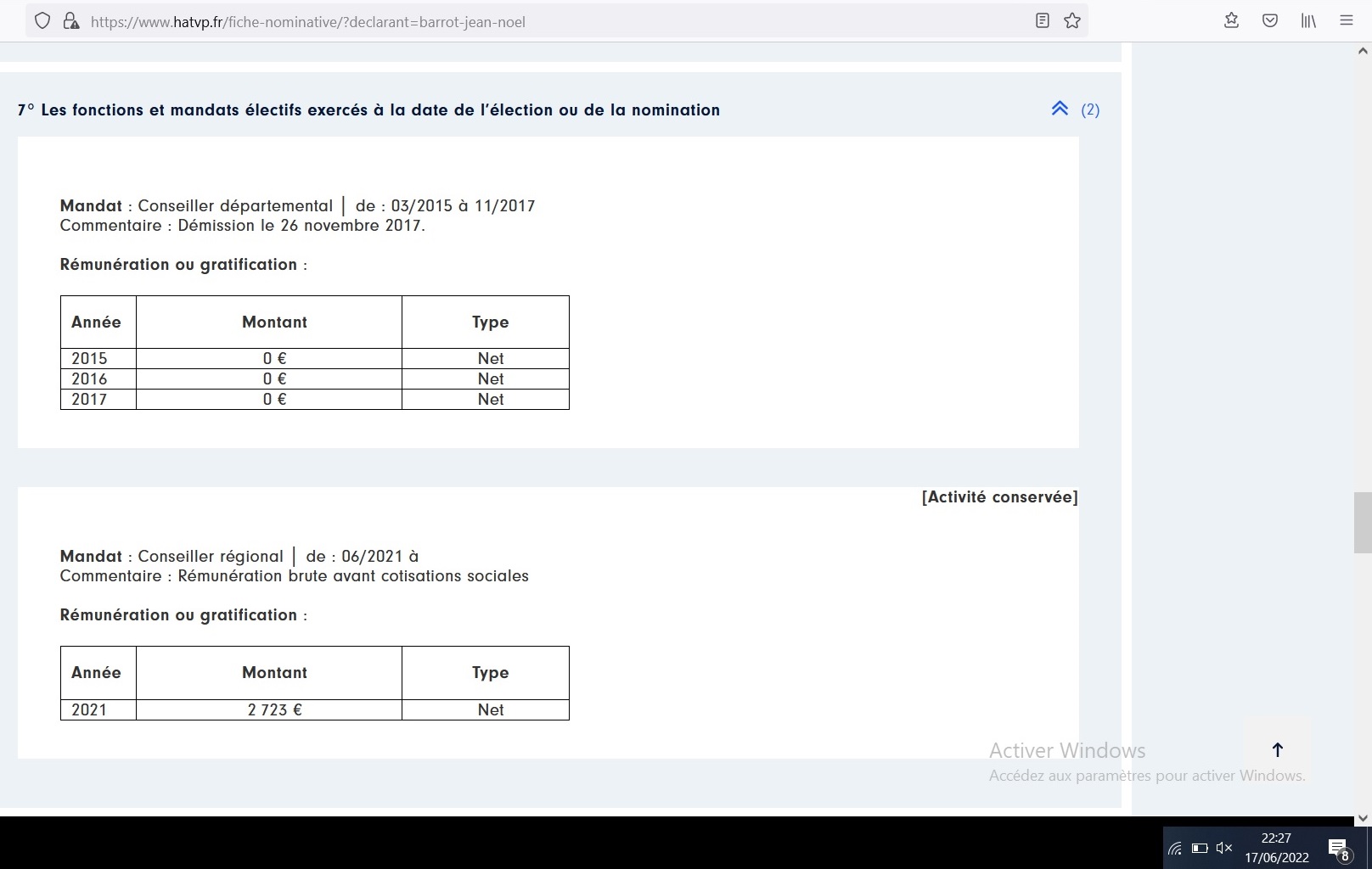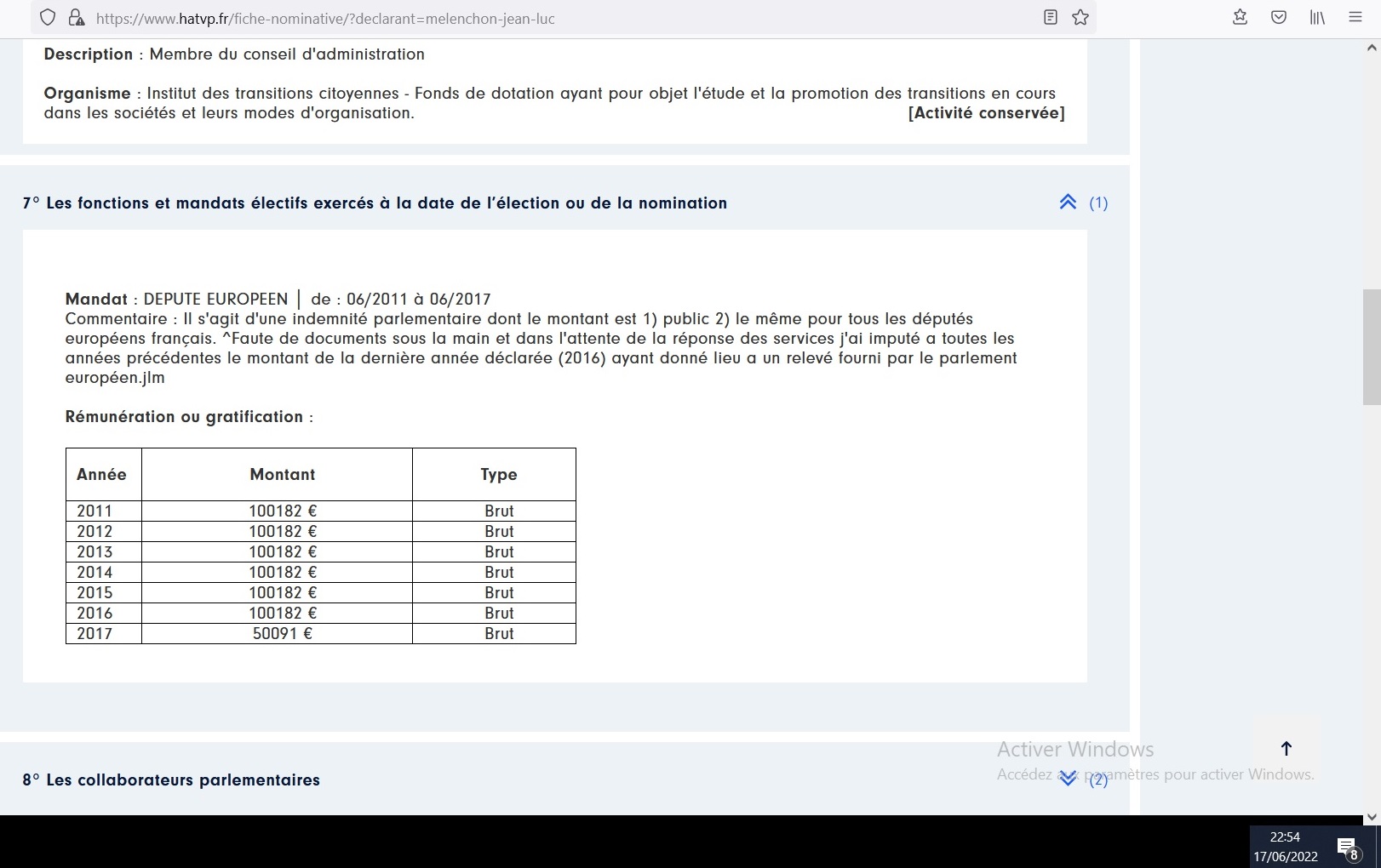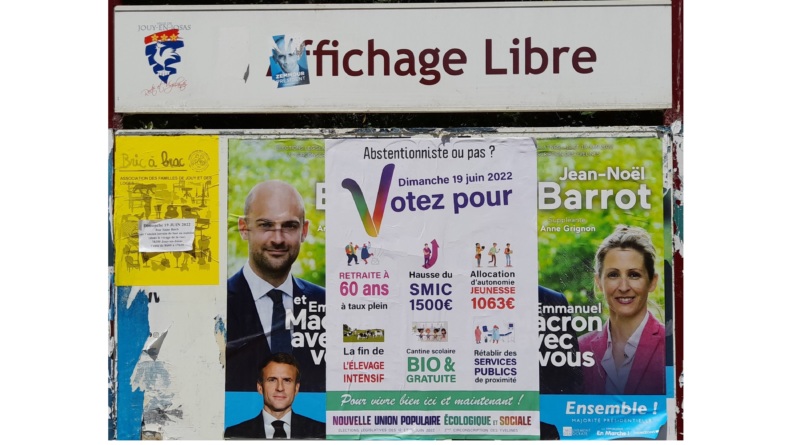Financial transparency and liberty
This week, a billboard particularly caught my attention. In the first glance, however, nothing very original: two election posters speak highly of the merits of those who printed them, all on a municipal support all the more mundane. But while at the second glance, numerous questions arise from this advertisement package
Let’s first look at the support then glance at the two political posters.
First of all, the panelboard: the word free dominates the images and the texts just below. It gives meaning to the whole. The objective of these posters does not precisely consist of allowing the elections to take place and hence, the proper functioning of the democracy?
Let’s look down now. The two posters overlap, in some kind of rage for the conquest of the advertising space. In the background, as a sort of support, the propaganda of the outgoing deputy, Jean-Noel Barrot (with his assistant Anne Grignon), placed in the center political exchequer, and supported by the head of the french state, Emmanuel Macron.
Glued to the first poster, comes the UNEP’s profession of faith (the new popular, ecologic, and social union), placed under the leadership, at the national level, of the deputy Jean-Luc Melenchon, considered as an extreme-right candidate by the political scientist Alain Duhamel. We can eventually ask if this extreme right does not serve to the centre and vice versa, in sort of a power play where extremes and moderates mutually find their interests.
Let’s go into a little more detail and start with the center represented, at the local level, by Jean-Noël Barrot, Professor of Economics at HEC, elected deputy in 2017, and the vice-president of the Finance Committee of the National Assembly. So someone brilliant and highly competent. However, when we look at the results of the state budgets – which are voted by Parliament – the figures rather evoke a bitter observation, not to say failure.
In 2018, despite an economic upturn, the Court of Auditors indicated that for the first time since 2014, and after three years of virtual stability, the State budget deficit increased in 2018, from €67.7 billion in 2017 at €76 billion. In 2019, the same Court specified that this budget ended with a sharply increased deficit compared to 2018, i.e. a deficit of more than 92 billion euros. Of course, it will be argued that the introduction of the withholding tax in 2019 moved public revenues from December 2019 to January 2020. This also means that the 2020 budget will be supplemented by the resources for this month of December 2019 But, sadly, the arrival of COVID-19, in 2020, unfortunately generated first health and social tragedies, and then an economic slowdown. The 2020 and 2021 budgets were also in deficit: -€92 billion for 2020 and a record -€220 billion for 2021.
This deficit is not the result of a bad period: it is structural. For more than forty years, our country has never been able to achieve a balanced budget. The amount of public debt rises, continuously, in times of crisis as well as in times of economic growth (2011-2019). In other words, we have been driving for a long time in a 1st class carriage with a second class ticket. Attention, however, to the arrival of the controller!
The problem lies in the fact that Jean-Noël Barrot does not tell us, in his propaganda, how he intends to balance our budgets and how will we repay our public debt. It would perhaps be good for a little more transparency to be made on this subject. Contrib’City had asked the MP what measures he planned vis-à-vis our deficit. The chosen one did not deign to answer.
But, as long as we talk about transparency, Contrib’City had also asked another question to the deputy, namely to which position he was going to give priority: teacher at HEC, secretary general of MODEM, adviser for the Ile-de-France Region or Member of the Parliament? Indeed, when JN Barrot was completely dedicated to his duties as a deputy, he had shown that he ran from RV to meetings, and from meetings to sessions of the Assembly, six days a week, including sometimes at night. So a very busy man, which seems normal for this type of responsibility. Then, Mr. Deputy had applied, and had been elected, for a mandate in the Ile-de-France executive, while keeping a teaching position! The days having only 24 hours, your favorite site had asked Jean-Noël Barrot which post would have his priority. But again, the MP did not respond.
Finally, there is one last question that Contrib’City would like to ask the elected representative. CC had highlighted the fact that at the very beginning of his mandate, the deputy, who had won the legislative elections of June 21, 2017, had indicated his income to the High Authority for the transparency of public life. We could even see his salaries as a researcher at MIT (and understand, suddenly, why many researchers leave France to go to other countries, including the United States).
But, since then, the situation of this declaration has been less clear: on the HATVP website, for the year 2021, the elected representative only indicates €2,723 in income (gross or net?) for his position as regional councilor of the Ile-de-France. To this must be added his remuneration as a teacher-researcher at HEC: €2,462 gross per month declared for the year 2020. Did he earn the same salary during the year 2021? This is not indicated: in his last statement dated November 29, 2021, it is just mentioned: activity retained.
Moreover, strangely, nothing on his position as the vice-president of the Finance Committee of the National Assembly, even though we are on the eve of choosing our next deputy for the second district of Yvelines, of which Jouy-en-Josas is a part. Hence the question: how much does Jean-Noël Barrot earn for his parliamentary mandate? As a reminder, the law on the transparency of public life requires elected officials to make their declaration of interests within two months of [their] appointment.
Finally, the candidate linked to Jean-Luc Mélenchon, Maïté Carrive-Bédouani, doctor in mathematics, therefore very comfortable with the strictness of numbers, completely forgets to inform us how she intends to finance her program: many promises, including some very sympathetic, but few indications on the financing of the latter, especially within the framework of a State indebted with six times its income (taking into account its commitments, like the retirement of the civil servants). Dr. Carrive-Bédouani talks about investments, but does not specify who will advance the funds: some business angels, some multinationals, the French state? But if it is the latter, who will advance the capital needed to finance the public debt: the private international banks or the taxpayers of France through their savings plans? Who? This is not specified in the program.
It should also be noted that Jean-Luc Mélenchon, following the example of his colleague Jean-Noël Barrot, did not declare his income as a deputy to the HATVP either.
If we want to continue to live more or less freely, we should pay attention to our debt. Otherwise, as said in the previous article, it is the creditors who will hold us accountable. Not sure if we are really free, then, to fail them without having to assume the consequences which could prove unfortunate.
To conclude, I will express one last question: is it that a little more transparency about the reality of our economic situations and about the income of our elected officials will help fight against abstention during elections? The debate is open.
French public deficit in relative values (in % of French GDP) and absolute values (in billions of euros)
| 2019 | 2020 | 2021 | var 2020-2021 | var 2019-2021 | |
|---|---|---|---|---|---|
| Public deficit as % of the GDP | -3.1 | -9.2 | -9.4 | -0.2 | -6.3 |
| Public deficit in value | -74.7 | -212 | -228 | -16 | -153.3 |
Sources : IFRAP, INSEE.


Translation: Vidhi Taparia.

